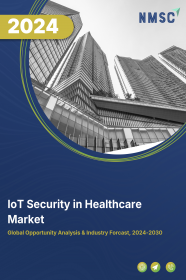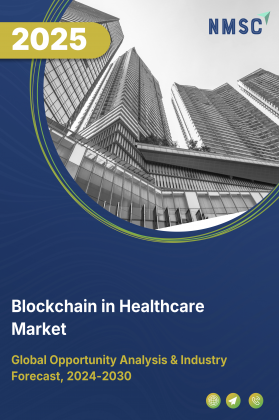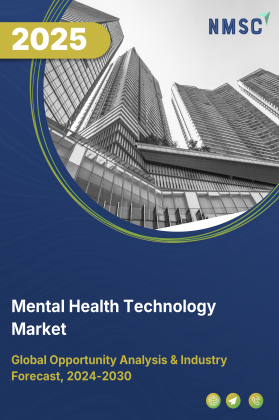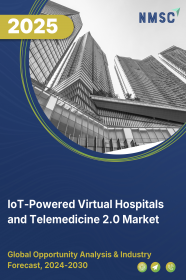
IoT Security in Healthcare Market by Component (Solutions and Services), by Security Type (Application Security, Cloud Security, Endpoint Security, Network Security, and Others), by Application (Pharmaceuticals, Medical Devices, Biotechnology, and Others), and by End-User (Hospitals, Clinics, and Surgical Centers)- Global Opportunity Analysis and Industry Forecast 2024-2030
IoT Security in Healthcare Market Overview
The global IoT Security in Healthcare Market size was valued at USD 6.02 billion in 2023 and is predicted to reach USD 26.76 billion by 2030 with a CAGR of 23.7% from 2024-2030.
IoT security in healthcare refers to the supply of the cybersecurity solutions that safeguards the integrity, availability and confidentiality of data sent via interconnected medical systems and devices. The industry consists of suppliers that provide specialized security services and technology to healthcare organizations to comply with regulations and to protect from cyber-attacks. These security systems create a safe and robust digital healthcare ecosystem that includes secure communication protocol, data encryption, threat detection, and response system specially for the healthcare industry.
Market Dynamics and Trends
The rising adoption of connected IoT devices in the healthcare industry for patient monitoring, data collection, and asset tracking is boosting the demand for strong cybersecurity infrastructure to protect sensitive patient information. According to a latest report published by the World Health Organization, there are around 2 million different kinds of medical devices categorized into more than 7000 generic devices groups are available across the globe.
These devices collect, store, and transmit sensitive medical data, making them potential targets for cyber-attacks, which in turn fuels the IoT security in healthcare market growth. Also, the market is significantly growing driven by the stringent rules and regulations such and HIPPA in the U.S., GDPR in Europe and other regional data protections acts that drives the need for strict data safety measures for the protection of sensitive patient information.
These strict regulations are planned for the protection of patient information, consequently driving the adoption of comprehensive security solutions to meet necessary standards. Moreover, the rising number of data breaches of sensitive patient information targeted by cybercriminals due to its high value in the black market is significantly boosting the growth of the IoT security in healthcare market.
As per the Ponemon Institute and Verizon Data Breach Investigations Report, the health industry experiences more data breaches than any other sector. Thus, the rise in data breaches facilitates the urgent need for resources towards pioneering security technology to protect against such breaches and safeguard the security and confidentiality of healthcare information.
However, the data security and privacy concerns associated with the IoT security systems used in the healthcare industry is restraining the growth of the market. The healthcare providers are often hesitant to adopt such new technologies due to the risk of data breach and misuse of patient information coupled with integration complexity with existing healthcare systems hinders the adoption of IoT security systems.
On the other hand, the incorporation of Physical Ubiquitous Environments (PUE) for IoT devices used in healthcare industry is anticipated to generate lucrative prospects for the market in the future. PUEs are interconnected physical spaces equipped with IoT devices and sensors, that enables smooth data exchange and integration. These environments enhance the capabilities of IoT in medical devices by providing real-time monitoring, data analytics, and automation.
Market Segmentation and Scope of Study
The global IoT security in healthcare market report is segmented on the basis of component, security type, application, and geography. Based on component, the market is classified into solution and service. Solution is further sub divided into analytics, encryption, data loss protection, identity & access management, and unified threat management. Services are further sub-divided into consulting services, risk assessment services, design & integration services, and managed security services. Based on the security type, the market is segmented into application security, cloud security, endpoint security, network security, and others. On the basis of application, the market is categorized into pharmaceuticals, medical devices, biotechnology, and others. Based on end-user, the market is divided into hospitals, clinics, surgical centers. Geographical breakdown and analysis of each of the aforesaid classifications include regions comprising of North America, Europe, Asia-Pacific, and RoW.
Geographical Analysis
North America dominates the global IoT security in healthcare market share and is potently expected to remain dominant in the industry, throughout the forecast period. This is attributed to the strict rules and regulations of the government in regards to patient data privacy, necessitating the healthcare sectors to adopt healthcare cyber security software.
For instance, the U.S. government established "the health insurance portability and accountability act (HIPAA)" to encourage healthcare institutions to keep healthcare data private and secret. The implementation of such strict regulations related to patient data safety is creating demand for IoT security in the healthcare industry. Also, the presence of major players such as IBM Corporation, Microsoft Corporation, and Palo Alto Network that are adoption various strategies including product launches is significantly boosting the market growth.
For instance, in April 2023, IBM launched new QRadar security solution designed to enhance the process of detecting and responding to threats. The suite leverages advanced analytics and artificial intelligence (AI) to improve cybersecurity in healthcare and other sectors. Therefore, it is anticipated that these initiatives from the key players will stimulate the market expansion in the area.
On the other hand, Asia-Pacific shows a substantial growth in the global IoT security in healthcare market trends, owing to the expansion of the healthcare infrastructure across the region fueled by the rising investment and advancement in healthcare technology.
According to the International Trade Administration, the medical device market in China is anticipated to grow with a compound annual growth rate (CAGR) of 8.3%, bringing it to USD 48.8 billion by 2026. This rapid expansion led the healthcare providers to adopt robust IoT security solutions for the protection of valuable patient information.
Moreover, the growing adoption of smart wearable and connected medical devices for regular health monitoring and management is further driving the market growth in the region. This rising trend is creating significant demand for comprehensive IoT security solutions to safeguard data integrity and information privacy. Thus, the healthcare practitioners are increasingly focusing on implementing advanced security systems to protect sensitive patient information transmitting through these devices.
Competitive Landscape
The IoT security in healthcare industry includes several market players such as Microsoft Corporation, IBM Corporation, Oracle Corporation, Intel Corporation, Cisco Systems Inc., Deutsche Telekom AG, Agile Cyber Security Solution LLC, Checkpoint Software Technology Ltd., Fortinet Inc., and Palo Alto Networks Inc. These companies are adopting various strategies such as innovation and collaboration to maintain their dominance in the global market.
For instance, in April 2024, Oracle launched new cybersecurity-focused service autonomous shield for its healthcare customers with a focus on cloud cybersecurity. This aims to help electronic health record clients migrate to Oracle Cloud Infrastructure, reducing cyber risk while boosting their performance.
Also, in March 2022, Microsoft launched Azure Health Data Services, a platform as a service (PaaS) to support both transactional and analytical workloads from the same data store. It also enables cloud computing to transform the development and implementation of AI across the healthcare ecosystem.
Key Benefits
-
The report provides quantitative analysis and estimations of the IoT security in healthcare market from 2024 to 2030, which assists in identifying the prevailing industry opportunities.
-
The study comprises a deep-dive analysis of the current and future IoT security in healthcare market trends to depict prevalent investment pockets in the industry.
-
Information related to key drivers, restraints, and opportunities and their impact on the market is provided in the report.
-
Competitive analysis of the key players, along with their market share is provided in the report.
-
A SWOT analysis and Porter’s Five Forces model are elaborated on in the study.
-
Value chain analysis in the market study provides a clear picture of the roles of each stakeholders.
IoT Security in Healthcare Market Key Segments
By Component
-
Solution
-
Analytics
-
Encryption
-
Data Loss Protection
-
Identity & Access Management
-
Unified Threat Management
-
-
Service
-
Consulting Services
-
Risk Assessment Services
-
Design & Integration Services
-
Managed Security Services
-
By Security Type
-
Application Security
-
Cloud Security
-
Endpoint Security
-
Network Security
-
Others
By Application
-
Pharmaceuticals
-
Medical Devices
-
Biotechnology
-
Others
By End-Users
-
Hospitals
-
Clinics
-
Surgical Centers
By Region
-
North America
-
The U.S.
-
Canada
-
Mexico
-
-
Europe
-
The UK
-
Germany
-
France
-
Italy
-
Spain
-
Denmark
-
Netherlands
-
Finland
-
Sweden
-
Norway
-
Russia
-
Rest of Europe
-
-
Asia Pacific
-
China
-
Japan
-
India
-
South Korea
-
Australia
-
Indonesia
-
Singapore
-
Taiwan
-
Thailand
-
Rest of Asia Pacific
-
-
RoW
-
Latin America
-
Middle East
-
Africa
-
REPORT SCOPE AND SEGMENTATION:
|
Parameters |
Details |
|
Market Size in 2023 |
USD 6.02 Billion |
|
Revenue Forecast in 2030 |
USD 26.76 Billion |
|
Growth Rate |
CAGR of 23.7% from 2024 to 2030 |
|
Analysis Period |
2023–2030 |
|
Base Year Considered |
2023 |
|
Forecast Period |
2024–2030 |
|
Market Size Estimation |
Billion (USD) |
|
Growth Factors |
|
|
Countries Covered |
28 |
|
Companies Profiled |
10 |
|
Market Share |
Available for 10 companies |
|
Customization Scope |
Free customization (equivalent up to 80 working hours of analysts) after purchase. Addition or alteration to country, regional, and segment scope. |
|
Pricing and Purchase Options |
Avail customized purchase options to meet your exact research needs. |
KEY PLAYERS
-
Microsoft Corporation
-
IBM Corporation
-
Oracle Corporation
-
Intel Corporation
-
Cisco Systems Inc.
-
Deutsche Telekom AG
-
Agile Cyber Security Solution LLC
-
Checkpoint Software Technology Ltd.
-
Fortinet Inc.
-
Palo Alto Networks Inc.




















 Speak to Our Analyst
Speak to Our Analyst

























